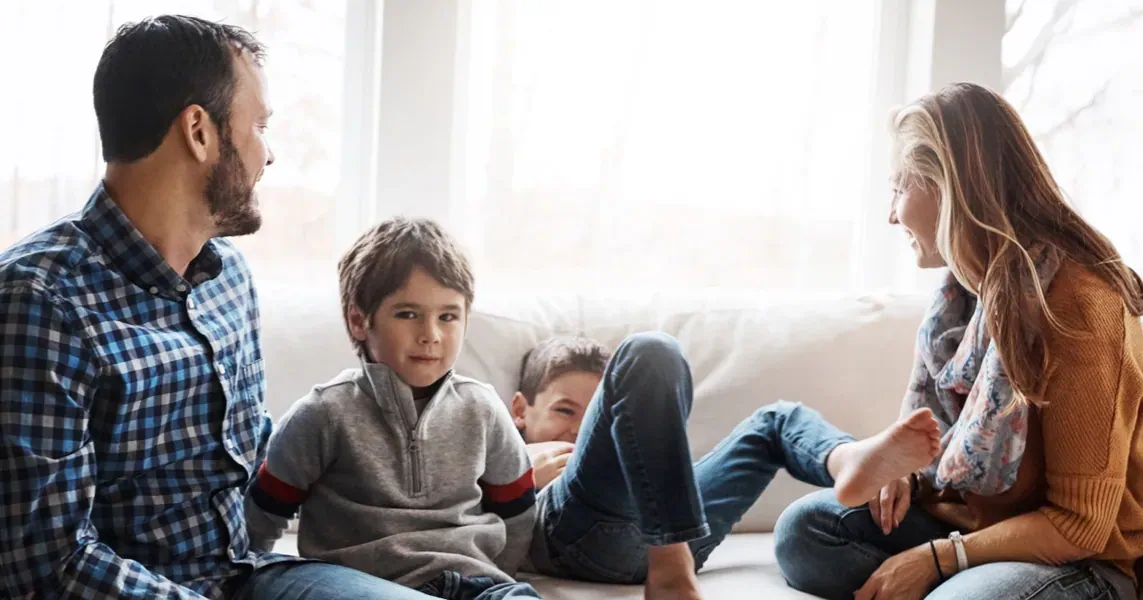Kids Fighting? Try These Positive Tips To Reduce The Rivalry

If you’re a parent or carer with more than one child, you probably have high hopes they'll get along. Maybe even become the best of friends.
However, the reality can be very different, and dealing with kids who are always fighting can be a stressful and ongoing issue.
So how can you help keep the peace – or give it more of a chance?
Here are some tips to help you feel less like a referee, and encourage more of the behaviours you want to see:
Is it normal for siblings to fight?
Yes, it is normal for siblings to have disagreements. They may argue, bicker, blame, refuse to share, become highly competitive, jealous or even get physical when they’re upset with each other.
There are times when one starts things more than the other, and then it switches. Sometimes, they can get along well for weeks at a time. Then it can feel like they can't breathe the same air without arguing.
Depending on their ages, different challenges may come up, too. For example, toddlers can struggle with sharing, while older children often experience feelings of unfairness or comparison.
Generally, kids go through all kinds of developmental changes and events that can lead to, or intensify, arguments and fights.
As frustrating as it can be, sibling rivalry is usually about learning.
Children are testing, practising and developing important life skills like problem-solving, compromising, collaborating and getting along with others. They’re learning how to manage and express big emotions.
Sibling relationships can be a ‘training ground’ to develop these skills. As they learn, things won't always go smoothly.
Seeing the bigger picture can help you deal with tricky situations a little more calmly.
The power of positive, one-on-one attention
Children crave connection from parents and carers. And when they feel like they must compete with their siblings for attention and quality time, conflicts can happen.
Family life is busy, and giving each child proper one-on-one time can be challenging. The good news is you can do many little things to help them feel unique and important.
For example, if you're cooking dinner and one of your children shows interest, invite them to help you stir or chop the ingredients.
Give them a gentle touch on the shoulder, a smile or a kind word as you pass by. Or you could come up with a fun bedtime phrase just for them.
Taking a genuine interest in their thoughts and feelings can also help. When they come to you with something to share or tell, take the time to really tune in.
Small acts of positive attention can make a big difference.
Avoiding comparison for better sibling relationships
To help kids build strong relationships with each other, it is best to avoid making comparisons.
Saying things like "Why can't you be more like your brother?" or "Your sister can do it, why can't you?" can cause siblings to feel resentful, jealous or inadequate.
The same goes for when kids are playing with their friends. It’s important to avoid any accidental comparisons, which can help prevent any misunderstandings or conflicts.
To create a supportive atmosphere where kids get along better, try to recognise and celebrate each child's unique strengths and interests.
For example, if one child likes art while the other is drawn to sports, encourage them to pursue their interests. Praise their efforts, not just their results.
To add another layer to this, try to avoid comparing your children's progress against each other. For example, if one child learnt to ride a bike earlier than the other, or is getting higher marks at school, try not to compare their progress.
Encourage children to be themselves, with their own strengths. This will help them feel valued and encouraged to grow and learn at their own pace.
Using descriptive praise for positive behaviours
Does it sometimes feel like your kids are always fighting?
When you feel like you’re holding your breath until the next drama happens, it’s easy to forget to notice when things are going well.
For example, when you catch them playing together and sharing peacefully, take a moment to recognise their positive behaviour with some descriptive praise.
Instead of using broad statements like "Well done" or "Good job", try being a little more specific.
For example, you could say something like, "It’s great to see you playing so nicely together. You're sharing your toys and taking turns so well. Keep it up, I'm proud of you."
If you notice caring or empathetic behaviour of one child towards their sibling, try to pay attention to it and praise it. For example, "That's so kind of you, trying to comfort your brother after he's hurt himself. Look at how you've helped him settle down."
Descriptive praise like this reinforces the positive behaviours you want to see.
Setting clear and consistent house rules
“It’s not fair!”
“She started it!”
‘No, I didn’t, they did!”
Sound familiar? Sibling relationships can be tricky, especially when there's a big age gap or different capabilities, or when children think they’re being treated unfairly.
A few clear and consistent family rules can boost fairness and cooperation, and reduce feelings of competition and resentment.
Find a moment when everyone is relaxed and involve them in creating a few guidelines such as "We speak kindly to each other" or "We take turns with toys and devices.”
Next time they have a disagreement, take a deep breath and try to stay calm. Remind them of the relevant family rule, without blaming anyone. For example, "What’s the rule about speaking kindly to each other?"
Encourage positive behaviour and give them a little time to figure out what to do next. They might even surprise you by resolving the issue themselves. However, if they can't seem to work it out, you might want to consider a fair and brief consequence.
For example, take away the toy or game that's causing the drama for five minutes. Let them know they'll get it back so they can try again.
Leading by example
When you find yourself caught in the middle of an argument, it can be difficult to feel calm and approach the situation positively. Even so, leading by example can be one of the most effective ways to encourage the behaviours you would like to see in your children.
Think about how you respond and react to disagreements and problem-solving. Children are always watching and learning from the adults around them.
Role modelling the behaviour you want to see can help children learn to regulate their emotions, compromise, problem-solve and be kind to others.
It may not be the immediate solution, yet it can be one of the most effective strategies in the long run.
Working together to resolve conflicts
When kids argue, it can be a chance to teach them how to talk things out and find a middle ground.
For example, if they’re caught up in a disagreement about which game to play, try to avoid making the decision or choosing for them. Instead, you could encourage them to find a solution where both can have fun, like playing one game for 15-30 minutes, then switching to another game.
Even if they can't agree, you can ask them what they think would be a fair solution.
Though it might not always go smoothly, you’re encouraging creative thinking and problem-solving skills. This can also help them feel empowered and respected, which can lead to less rivalry over time.
Taking a step back
While toddlers and young children need more guidance and support, older children are often capable of solving some problems themselves. Even though it can be tempting to jump in and help, giving them space to resolve things independently (or with a little less guidance) can be unexpectedly effective.
Next time, consider taking a step back and watching from a slight distance to see how they might handle it themselves.
Sometimes, giving them a chance to work things out on their own can lead to surprising results!

